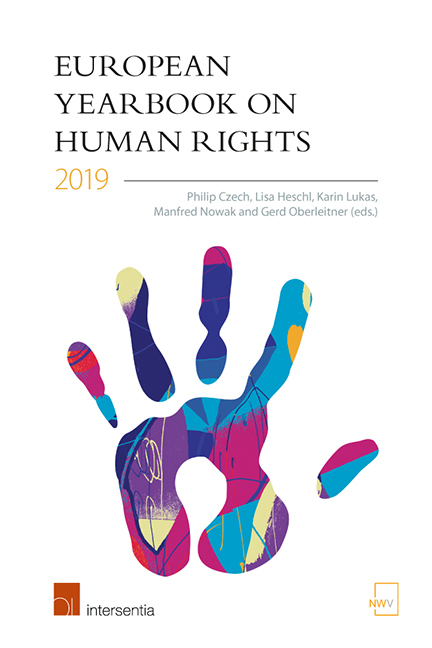Book contents
- Frontmatter
- Miscellaneous Frontmatter
- Editors’ Preface
- Contents
- List of Abbreviations
- List of Contributors
- PART I TOPIC OF THE YEAR
- PART II EU
- The Strange Case of Northern Ireland's Disappearing Rights in the EU-UK Withdrawal Negotiations
- Can Reasonable Accommodation Safeguard the Employment of People with Disabilities?
- Whistleblowing in Europe: A New Era of Legal Protections
- A Critical Take on Opinion 1/15: Is the Glass Half Full or Half Empty?
- Absolute Rightlessness Sur Place through Excessive Externalisation
- Corporate Accountability Mechanisms in EU Member States for Human Rights Abuses in Third Countries
- PART III CoE
- PART IV OSCE
- PART V REPORTS FROM THE FIELD
- PART VI OTHERS
- PART VII BOOK REVIEWS
- Index
The Strange Case of Northern Ireland's Disappearing Rights in the EU-UK Withdrawal Negotiations
from PART II - EU
Published online by Cambridge University Press: 24 January 2020
- Frontmatter
- Miscellaneous Frontmatter
- Editors’ Preface
- Contents
- List of Abbreviations
- List of Contributors
- PART I TOPIC OF THE YEAR
- PART II EU
- The Strange Case of Northern Ireland's Disappearing Rights in the EU-UK Withdrawal Negotiations
- Can Reasonable Accommodation Safeguard the Employment of People with Disabilities?
- Whistleblowing in Europe: A New Era of Legal Protections
- A Critical Take on Opinion 1/15: Is the Glass Half Full or Half Empty?
- Absolute Rightlessness Sur Place through Excessive Externalisation
- Corporate Accountability Mechanisms in EU Member States for Human Rights Abuses in Third Countries
- PART III CoE
- PART IV OSCE
- PART V REPORTS FROM THE FIELD
- PART VI OTHERS
- PART VII BOOK REVIEWS
- Index
Summary
ABSTRACT
The draft European Union (EU)-United Kingdom (UK) Withdrawal Agreement did not suddenly coalesce in November 2018. It was the product of a process involving multiple iterations, some of them public, including the Joint Report of December 2017, the EU Commission's draft text of March 2018, and the UK negotiating position of June 2018. From the outset of this process, securing the Good Friday/Belfast Agreement and an open border in Ireland were accepted by all negotiating parties as priorities for the first phase of Brexit negotiations. What rapidly became evident, however, was that there was no shared understanding of what those goals required. Through these snapshots of the negotiations the Good Friday/Belfast Agreement's requirements were framed and reframed. As a result, understandings of concepts of non-diminution and non-retrogression shift ed across these documents. So too did the categories of rights-holder within Northern Ireland, and the degree to which EU rights will still be able to be relied upon in what, following the completion of the withdrawal process under Article 50 of the Treaty on European Union, is set to become territory external to the EU. This contribution examines how the potential scope of EU rights protections operating in Northern Ireland narrowed during the negotiations towards the draft Withdrawal Agreement and reflects upon whether this narrowing is better explained by the UK's robust negotiating position, or by the extent to which the EU institutions became concerned with the implications of the potential reach of the special status on offer for Northern Ireland for the coherence of EU law.
INTRODUCTION
Since the Brexit referendum outcome, a repeated refrain from the UK Government has been its ongoing commitment to the Good Friday/Belfast Agreement (GFA), the peace agreement which helped to resolve over 30 years of conflict in Northern Ireland. When she set out her Brexit negotiation priorities in her Lancaster House speech in January 2017, Theresa May emphasised that ‘[n]obody wants to return to the borders of the past’. This position had not changed in the summer of 2018, when she told an audience in Belfast that ‘the seamless border is a foundation stone on which the Belfast Agreement rests […] anything that undermines that is a breach of the spirit of the Belfast Agreement’.
- Type
- Chapter
- Information
- European Yearbook on Human Rights 2019 , pp. 35 - 62Publisher: IntersentiaPrint publication year: 2019
- 1
- Cited by



